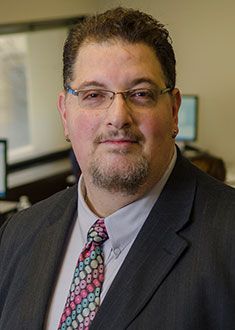
Gaetano "Guy" Lotrecchiano, Ph.D., Ed.D., assistant professor of clinical research and leadership, and of pediatrics at the George Washington University (GW) School of Medicine and Health Sciences (SMHS), took some time out of his busy schedule to talk to us about his latest research and his road to GW.
What inspired you to enter the field of clinical research?
I’m not sure I can pinpoint what inspired me to pursue a career in clinical research, but rather clinical research inspired me to become more curious about what I could bring to the field. My initial doctoral training was in ethnomusicology, the study of music emphasizing the cultural, social, material, cognitive, biological, and other dimensions or contexts. For a good period of time my role was a field researcher and then a research education administrator. Eventually, I found that I could contribute more to clinical research as a social scientist in this changing health care climate. After completing my second doctorate in human and organizational learning at GW’s School of Education and Human Development (GSEHD), I was able to find a happy medium as a team science specialist and translational research instructor, which is now the role I play in health sciences.
Why did you decide to come to the George Washington University?
Change is around every corner at GW. When I considered where I might want to ‘hang my hat’ I knew a university that found itself at a crossroads and re-envisioning the future was where I wanted to be. GW synthesizes tradition and innovation, stability and growth, and surety and restlessness. I thrive in complex environments with lots of moving parts, and GW seems to be always looking for new ways to improve and expand.
What was your role as a past principal investigator of the District of Columbia Leadership Education in Neurodevelopmental Disabilities (DC LEND) program at Children’s National Medical Center (Children’s National)?
I spent 13 years at Children’s National. During that time I wore many hats. One of my most enjoyable responsibilities was as the principal investigator of the DC LEND program funded by the Health Resources and Services Administration. This interdisciplinary training program for graduate level through career professionals teaches trainees how to effectively address the needs of children with disabilities and their families. Our work at Children’s National in this program was extremely rewarding and our partners throughout the region’s 11 universities helped forge a regional team of professionals training professionals, advocating for change in the community, and disseminating scholarships. Today, I partner with GSEHD as an advisor to the new Center for Developmental Science and Neuroeducation. I look forward to helping my colleagues build a lasting legacy of interdisciplinary team training for those who care for people with disabilities.
Can you describe for us the research you are currently working on?
My research is in the growing and evolving world of team science and translational research. Presently my interests have led me to two major research agendas. The first is inquiry into the social dynamics associated with scientific teams of stakeholders and the social interactions that make teams fertile environments for innovation and new knowledge generation. Much of this is informed by complexity science and transdisciplinary studies but is also highly dependent on grounded theory and multilevel research. Basically, I am a social scientist at heart, and I like to work with people to find out how they perceive relationships, especially in scientific and health care environments. Another interest of mine involves the relationship between different academic disciplines and the roles that people play in teams. This research is rooted in a desire to understand how we can learn from one another’s expertise and become more effective and efficient team members when we understand the different characteristics of each other’s roles and disciplines when considered separately and in tandem. These are both very dynamical studies.
What have you learned from your students?
Since 2005, as an educator at Children’s National and a professor at GW, I have been humbled by the graduate students I work with. Smart, witty, strong-minded, tenacious — you name it they’ve been in my class. Over the years my students continue to surprise me with their dedication and gratitude, even when I think that somehow I didn’t meet their expectations. They have shown me that no matter the circumstances, they are here to learn. My students remind me that they need me to be the best teacher I can be, and I thank every one of them for it.
What do you find most satisfying about your work?
I have taught in one capacity or another since my bachelor’s degree when I taught K-8 music education more than 25 years ago. There is nothing more satisfying than being part of the lives of people when they are learning. There is a sense of excitement and awe when people have an experience of being newly aware. Receiving the Bender Teaching Award, being nominated by my adult students because of the role I played in their lives, was one of the most empowering experiences I ever had. My students share their lives and ask me to share mine with them.
What do you enjoy doing in your free time?
Every couple of weeks, I get to escape the hustle and bustle of the city and retreat to my cozy home on the Delmarva Peninsula in the town of Snow Hill, Md. My partner of 15 years, Paul Moscatt, who is a systems analyst at Children’s National, and I love working on our 180-year-old historic home, hanging out with our two St. Bernard pups, Oscar and Natasha, and enjoying the simple life of country fairs, oyster bakes, living on the Pocomoke river and all the crabs you can eat!


